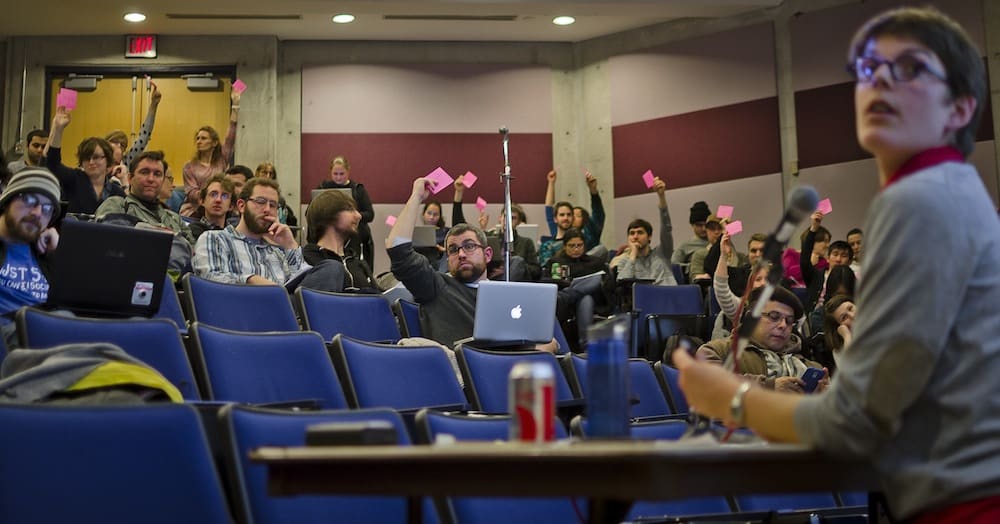Conflict continues to divide a major organization through which universities lobby the provincial and federal governments. The Canadian Federation of Students (CFS) has made no changes in reaction to protests outside their Annual General Meeting (AGM) by various student unions last week.
Jonathan Mooney, secretary-general of the Post-Graduate Students’ Society of McGill, organized the protests. The Concordia Student Union and the Dawson Student Union also participated.
“A couple weeks before the protest, some of the students within Montréal started talking to each other and said: ‘The meeting’s coming up; we’re really discontent; we’re really upset, and they keep refusing to recognize it,’” said Mooney, explaining how the idea for the protest developed. “We’re stuck in court waiting for the judge to rule on the issue. We’re extremely upset because we’re finding that a lot of the money that we would like to spend on important issues for students is being consumed on litigation costs… And so we started talking and saying ‘Maybe we should draw some attention to the issue.’”
The protests are just one episode of what has been a long, complicated conflict between the CFS and the aggrieved student unions. The organizations in question argue that the CFS’s practices are undemocratic, and that it has a history of silencing dissent. Feeling that the federation has not responded adequately to these allegations, the unions have launched efforts to decertify from it.
Prior to the AGM, a number of students at CFS member universities, including the University of Toronto Graduate Students’ Union (GSU), had submitted petitions to hold referenda to defederate from the CFS. While some of these petitions were received, others were not claimed upon delivery or were even returned to sender after being signed for.
“One of our objectives was to hold the national executive accountable for this error, no matter how it came about, because it was a very grave error to miss students’ petitions and not deal with this issue,” said Brad Evoy, external commissioner of the GSU. “So we put forward a motion [at the AGM] to unseat the national chairperson.” The motion did not pass, but Evoy emphasizes that it was mainly an effort to get the federation to examine the unions’ grievances more carefully, and to try to push it toward reform.
According to Alastair Woods, chair of the Canadian Federation of Students-Ontario (CFS-O), the CFS explained that the petitions were not received because of a clerical error. He added that the CFS has since received the petition from the Laurentian University Graduate Students’ Association.
Woods argued that organized protests were not the best way for student unions to advance their interests at the AGM: “Those student unions had an opportunity to bring up those concerns as delegates to the meeting,” he stated. “They chose not to be delegates to that meeting and instead chose to protest outside the venue, and that’s a choice they have a right to make, but they could have also participated as delegates and brought their concerns to the plenary and to other students across the country.”
Woods emphasized that students risk their own interests if they seek to leave the CFS. Without the strength of numbers, Woods contended, it would be much more difficult for students to influence government.
“I think that students across this province and across the country are facing a huge crisis — whether it be tuition fees, employment, [or] standards of living — and I think what they need is a united student movement that’s able to move forward and actually affect issues that impact their daily lives,” said Woods. “From my perspective, the best way to do that and to move forward from this situation is to come together and actually tackle the issues that are facing students — tackle the issue of student debt, tackle the issue of rising tuition fees, and ensure that more and more students are being brought into the movement so that they can participate in that and actually be part of that change that we need to see in order to save this generation from being pushed off the brink.”
Woods further argued that conflict between student unions only makes it easier for governments to pass policy that is detrimental to the interests of young people and students.
Guled Arale, vice-president, external of the University of Toronto Scarborough Students’ Union (SCSU), offered a similar perspective: “It’s unfortunate, with so many issues facing students — especially at U of T — like students wanting to leave Access Copyright, tackling flat fees, and a couple other issues that, instead of having conversations to figure out how we can tackle it, there’s talk and time being spent just on things like people wanting to leave [CFS].”
The would-be defederators understand these concerns, but argue that they miss the point. “Students want to work together; we want to be able to advance our common interests,” stated Mooney. “But when there’s an association out there that doesn’t respect basic principles like freedom of association and listening to the democratic will of students, it makes it a lot more difficult and wastes a lot of our resources.”
The GSU held its own AGM on November 25. At the meeting, the union passed motions to call on the CFS to abide by dates to hold referenda set in the petition. The union also passed an amendment to that motion, demanding that the federation replace Katherine Giroux-Bougard as Chief Returning Officer (CRO) for the referendum. Giroux-Bougard was chair of the CFS in 2009, and actively campaigned against defederation during her term.
U of T, the GSU, and the CFS are currently discussing how the university can provide the CFS with student information so that it can verify the names on the defederation petition without compromising the privacy of the individuals on the list of students provided.


